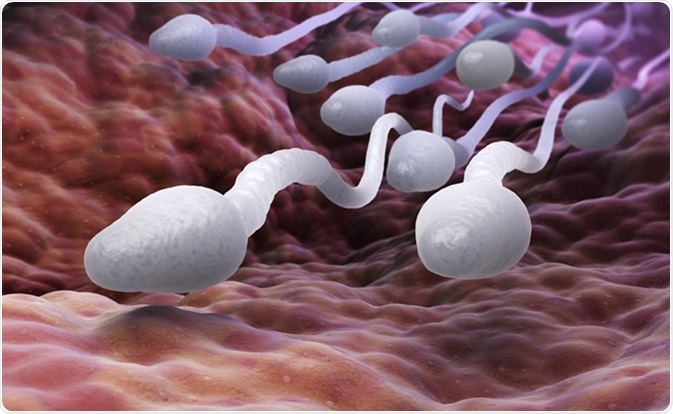Skip to
Several studies over the years have found a close link between psychological stress and infertility. Infertility is becoming more common these days, affecting 12 of 100 couples in the US. In about one-third of these cases, the male partners have fertility issues, while another one-third due to female reproductive problems. In the rest, both male and female factors are involved, or the cause is unknown.
The most common causes of infertility in men include erectile dysfunction, low sperm concentration and motility, blocked tubes, and stress.
According to Ourworldindata.org, the prevalence of anxiety disorders varies from 2.5 to 7% from one country to another. In 2017, an estimated 284 million people across the world experienced a stress- or anxiety-related disorder. Of these, 63% (179) million were females and 105 million males.

Sperm cells. 3D illustration. Image Credit: Tatiana Shepeleva / Shutterstock
How does stress affect sperm quality?
The mechanism by which stress affects the quality of semen is not fully understood yet. According to researchers, stress may cause the release of steroid hormones such as glucocorticoids, which can decrease testosterone levels as well as sperm production. Oxidative stress is another possibility and has been found to adversely impact semen and sperm quality and fertility.
Besides the link between the quality of semen/sperm and stress, one study focused on the subjective as well as objective assessment of stress and confirmed the close association between stress and sperm concentration, appearance and motility in semen.
Evidence linking stress and sperm quality
One study by Jurewicz et al. included 179 men with sperm counts ranging from normal (15-300 million/ml) to lower than average (a condition known as oligospermia), at >10-15 million/ml. The results showed that stressful work periods negatively affect semen volume and the percentage of progressive spermatozoa. These had an adverse impact on semen quality and fertility. This confirmed the adverse effects of occupational stress on semen quality.
Another study at Soroka University Medical Center in Beer-Sheva, Israel, and the Ben-Gurion University of the Negev (BGU) found that prolonged stress, as in soldiers on active wartime duty, reduced sperm quality. There was a 47% increase in chances of impaired sperm motility with samples obtained during a stressful time compared to those obtained during normal periods. Poor sperm motility thus affects the chances of successful fertilization.
Researchers at Rutgers School of Public Health and Columbia University's Mailman School of Public Health confirm these correlations. According to them, stress affects the concentration and morphology of sperm, and also its ability to fertilize an ovum. Using both subjective and objective assessments, they found semen quality to be inversely proportional to mental stress. Workplace stress affected testosterone levels and could therefore impact the reproductive health of these men. The sperm quality of unemployed men was also lower than that of employed men.
How to improve sperm quality
These are some simple ways to improve sperm quality in stressful situations:
- Stay physically active and practice stress relaxation techniques
- Follow a healthy diet with fresh fruits and vegetables
- Mintain a healthy body mass index (BMI)
- Quit smoking and limit alcohol intake
- Try and stay cool, wear loose-fitting underwear, and avoid hot tubs and saunas
- Consult with your doctor before taking new medications that may possibly affect sperm count and fertility
Further Reading
Last Updated: May 21, 2019